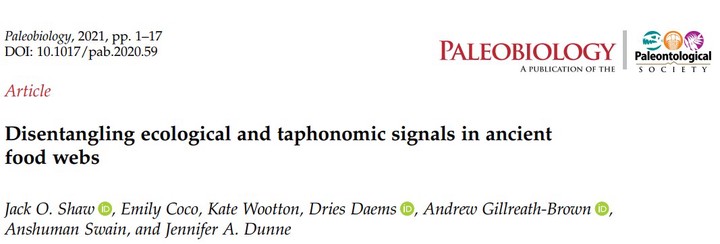 Unraveling the effects of time-averaging on fossilized foodwebs
Unraveling the effects of time-averaging on fossilized foodwebs
Abstract
Analyses of ancient food webs reveal important paleoecological processes and responses to a range of perturbations throughout Earth’s history, such as climate change. These responses can inform our forecasts of future biotic responses to similar perturbations. However, previous analyses of ancient food webs rarely accounted for key differences between modern and ancient community data, particularly selective loss of soft-bodied taxa during fossilization. To consider how fossilization impacts inferences of ancient community structure, we (1) analyzed node-level attributes to identify correlations between ecological roles and fossilization potential and (2) applied selective information loss procedures to food web data for extant systems. We found that selective loss of soft-bodied organisms has predictable effects on the trophic structure of “artificially fossilized” food webs because these organisms occupy unique, consistent food web positions. Fossilized food webs misleadingly appear less stable (i.e., more prone to trophic cascades), with less predation and an overrepresentation of generalist consumers. We also found that ecological differences between soft- and hard-bodied taxa—indicated by distinct positions in modern food webs—are recorded in an early Eocene web, but not in Cambrian webs. This suggests that ecological differences between the groups have existed for ≥48 Myr. Our results indicate that accounting for soft-bodied taxa is vital for accurate depictions of ancient food webs. However, the consistency of information loss trends across the analyzed food webs means it is possible to predict how the selective loss of soft-bodied taxa affects food web metrics, which can permit better modeling of ancient communities.